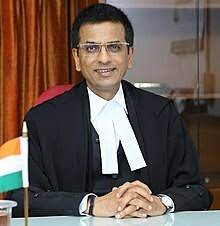Chief Justice of India DY Chandrachud has expressed his displeasure over people adopting a single ableist perspective while designing architectural models, intellectual resources, and institutional designs in the country.
He gave examples of narrow lift doors and entry thresholds, which often went unnoticed by those without disabilities but created significant obstacles for those with mobility issues.
The CJI noted that the law identified that these barriers created disabilities and excluded persons from equal participation in social, economic and cultural terms.
Delivering the inaugural address at the India Accessibility Summit and State Disability Commissioner’s Conclave 2024 in Bengaluru on Saturday, he called for consistent efforts to recognise and overcome the systemic ableism, in order to foster a more inclusive and equal society.
He observed that laws and technology were instruments of change. Disability and accessibility were both complex social phenomena and the solutions lie in social dialogue.
Persons with diabilities have long been objects of scorn, “fun” and vile comments even within institutions. The indifference shown by such casual dismissal of the disabled needs to be deliberately combated to do away with the stigma against them, he added.
The CJI said that under-representation of PwDs due to these barriers excluded them from public discourse, thus violating a whole range of their civil rights and compromising their citizenship as well as fundamental freedoms.
This exclusion also robbed the public discourse of valuable inputs, leaving the society with a deluge of ableist perspectives that overcrowd the social conscience and weighed heavily on the way to look at the world.
Quoting Caroline Perez’s findings on workplace bias, the CJI said that the physical infrastructure and some policy considerations were ableist, which stemmed from the lack of participation and also further entrenched the lack of participation of PwDs – forming an endless loop of exclusion.
He highlighted several initiatives and success stories that have started to break this loop, including Karnataka’s ‘Participatory Governance in Disability’ policy, which promoted participation through various social programs.
CJI Chandrachud further lauded the Indian corporate institutions for leading by example in creating diverse workspaces, noting that inclusive hiring practices have become better economic and institutional choices.
He further pointed out the importance of addressing non-visible disabilities (NVDs) and the stigma surrounding them.
He mentioned a 2014 report in the Economic Times, which found that 71 percent of children with disabilities lived in rural areas with fewer support structures.
He stressed on active diagnosis, education and awareness campaigns, noting that these would go a long way in overcoming the stigma and prejudice around NVDs.
The CJI called for continuous and cooperative efforts to dismantle the shameful walls of exclusion, quoting Javed Abidi, a pioneer in the disability rights movement, who once said, “I don’t want the future generations of people with disabilities to experience an India that does not include them.”


